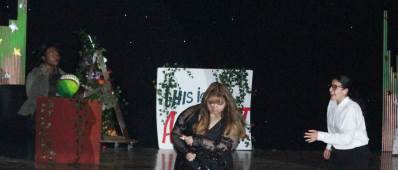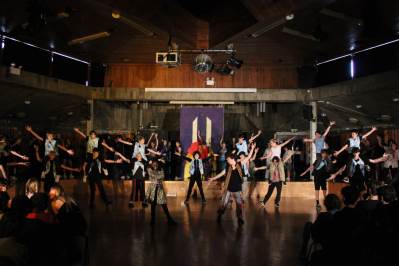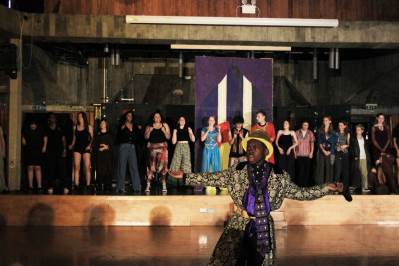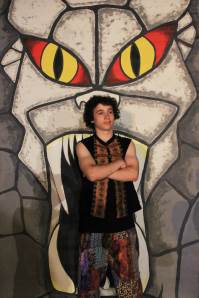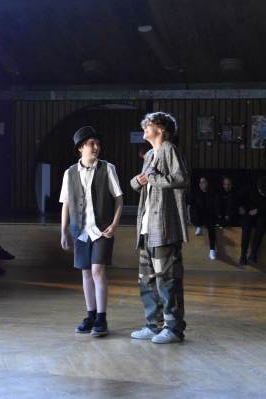Drama
We must all do theatre to find out who we are and to discover who we could become.
Theatre is a form of knowledge; it should and can also be a means of transforming society. Theatre can help us build our future rather than just waiting for it.
Augusto Boal
The Drama curriculum at Acland Burghley explores Drama as an exciting art form and a tool for understanding and examining the world around us. We give our students a wide range of opportunities to learn and utilise various practical strategies that reveal a greater appreciation for others’ beliefs, experiences and circumstances; enabling our students to grow in empathy and knowledge. We also develop their rehearsal and performance skills and broaden their appreciation of theatre history, play texts and dramatic styles and thus we encourage our students to engage with the rich theatrical culture that surrounds us.
Head of Creative Arts and Technology Faculty
G Frye | gfrye@aclandburghley.camden.sch.uk
Subject Lead
C Robinson | crobinson@aclandburghley.camden.sch.uk
Teachers
R Kosky | rkoskyhensman@aclandburghley.camden.sch.uk
Curriculum
KS3
Curriculum Intent
At KS3, our curriculum is varied and broad with students developing techniques such as physical theatre, soundscape, monologue and slow motion; learning about the deforestation of the rain forests, ancient Greek theatre and clowning; exploring issues such as oppression and social exclusion and bringing to life texts by a broad range of writers including Malorie Blackman, Roy Williams and Parv Bancil. Students learn about the role of the actor, director and spectator, analysing live theatre productions as well as experiencing the value of drama as a process of exploration rather than simply an end product. There is a focus on inclusion and cooperation in our lessons, where every child is encouraged and expected to join in to fulfil their potential and gain confidence and teamwork skills, as well as build trust amongst their peers. All students are timetabled for two hours a fortnight, and at KS3 homework is set each half term. Homework comes in a range of forms, from research tasks to rehearsals or learning lines; all of which feeds back into their classwork in order to improve and deepen their own and others’ work
Curriculum Map
Y7
Autumn 1: Once Upon a Time (Toys)
Autumn 2: Once Upon a Time (Fables)
Spring 1: Clowning
Spring 2: Commedia dell'Arte
Summer 1: Shakespeare
Y8
Autumn 1: Ancient Greek Theatre
Autumn 2: Medea
Spring 1: Forum Theatre
Spring 2: Noughts and Crosses
Summer 1: Climate Change (Devising)
Y9
Autumn 1: Blood Brother
Autumn 2: Verbatim
Spring 1: Godber Texts
Spring 2: Comedy (Devising)
Summer 1: Theatre Analysis
Useful websites
Things to see and do
Any exposure to live drama experiences or theatre productions will encourage a greater appreciation of our subject and will build confidence and develop invaluable, transferrable skills. There are a number of local theatres that offer reasonably priced tickets to their productions including; Park Theatre, The Pleasance, Arcola, The Unicorn, Jacksons Lane, Hampstead Theatre and Kiln Theatre.
Extra-curricular activities and clubs
Students in every year group get at least one opportunity each academic year to be involved in a specific project, series of workshops or performance, on occasion working with outside specialists. We recommend making the most of these unique and fulfilling opportunities as they give students the chance to work with skilled individuals from different classes, year groups or institutions and they can develop their creativity and confidence in a more professional environment.
We run a Y7 and a Y8 and Y9 drama club weekly and there is also an annual performing arts production open to all students, who can take part in a variety of performance or backstage/technical and design roles. The performance takes place in the summer term.
KS4
Curriculum Intent
Why it is a great choice
Students will have lots of diverse and creative opportunities to:
- Explore issues, beliefs and texts using different drama techniques to encourage a deeper understanding of the world we live in and those we live among, making us more empathetic towards others in and outside of our communities.
- Be involved in practical, creative work, especially when working as part of a team, which can be liberating and exciting and will often provide a healthy contrast to your other studies.
- Show employers and universities that you are a candidate with a wider outlook on life and a willingness to ‘think outside of the box’ as GCSE Drama encourages this broader thinking. Employers are often interested in people who have studied GCSE Drama, as communication, presentation and teamwork skills are essential in all forms of employment.
- See live theatre and take part in professional workshops!
Curriculum Map
Y10
Autumn term: Mock Component 03: Presenting and Performing Texts
Spring term: Studying a set text and response to live theatre for Component 04: Performance and Response
Summer term: Mock Component 01: Devising Drama
Y11
Autumn term: Component 01: Devising Drama
Internally examined performance and coursework
Spring term: Component 03: Presenting and Performing Texts
Externally examined coursework and performance to a visiting examiner
Summer term: Preparing for final Component 04 written exam
GCSE Subject Specification
Please click through to the links to view more information on the OCR website.
Drama - OCR Exam Board
| https://www.ocr.org.uk/images/242630-specification-accredited-gcse-drama-j316.pdf |
Suggested reading (all available to borrow from the drama office)
‘Missing Dan’ Nolan by Mark Wheeller
‘Too Much Punch for Judy’ by Mark Wheeller
‘100’ by Diene Petterle, Neil Monaghan and Christopher Heimann
‘The Resistible Rise of Arturo Ui’ by Bertolt Brecht
‘The Colour of Justice’ edited by Richard Norton-Taylor
‘One Night in Miami’ by Kemp Powers
‘Girls Like that’ by Evan Placey
‘Metamorphosis’ by Steven Berkoff
‘A Midsummer Night’s Dream’ by William Shakespeare
‘The Complete Brecht toolkit’ by Stephen Unwin
‘The Complete Stanislavski toolkit’ by Bella Merlin
Useful websites
- nationaltheatre.org.uk/young-people
- BBC Bitesize for GCSE Drama
- Naturalism and Stanislavski on BBC Bitesize
- Epic theatre and Brecht on BBC Bitesize
Things to see and do
Any exposure to live drama experiences or theatre productions will inspire and improve the quality of students work and understanding of the complexities of live theatre. There are a number of local theatres that offer reasonably priced tickets to their productions including; Park Theatre, The Pleasance, Arcola, The Unicorn, Jacksons Lane, Hampstead Theatre and Kiln Theatre.
Extra-curricular activities and clubs
KS4 students have the opportunity to take part in the whole school production as a performer or as a member of the backstage/technical/design teams. The performance takes place in the summer term.
We also encourage KS4 students to take leadership roles, by running one of our KS3 drama clubs, by leading improvisation and warm-up activities with the opportunity to direct a KS3 project.
Aladdin performance
KS5
As part of the LaSWAP consortium, Acland Burghley offers the following level 3 courses. Please click on the links below to view more information on the LaSWAP website.

